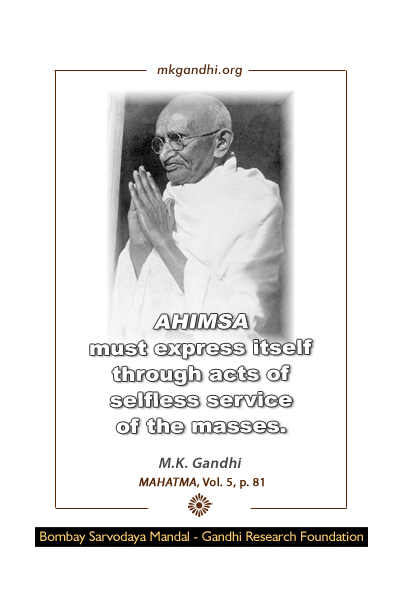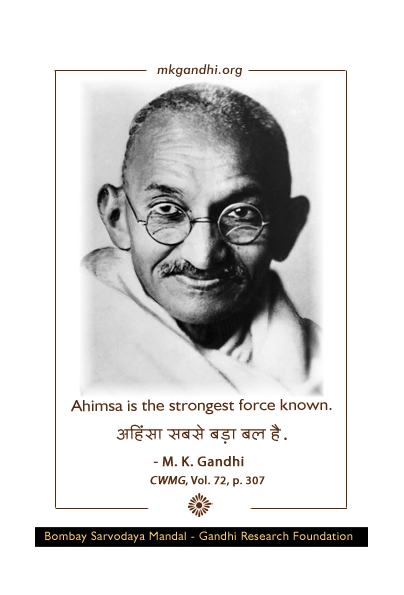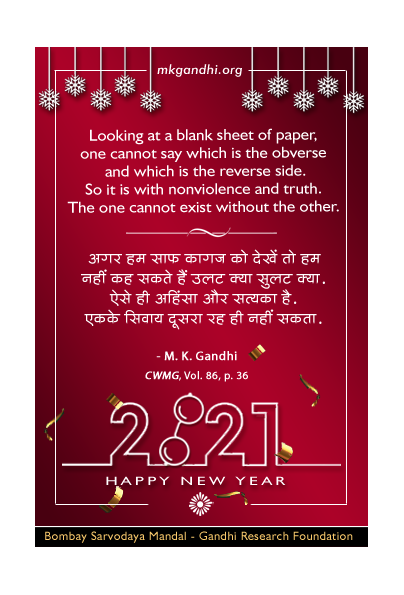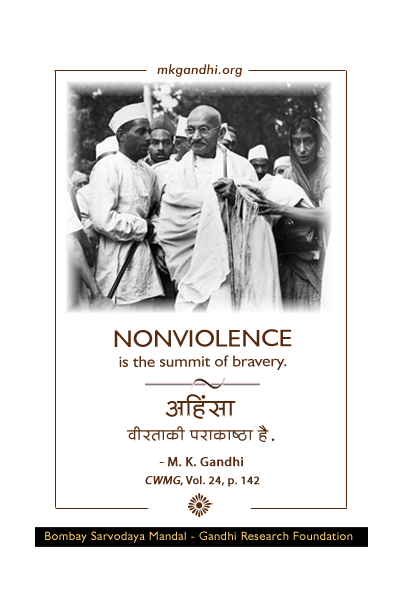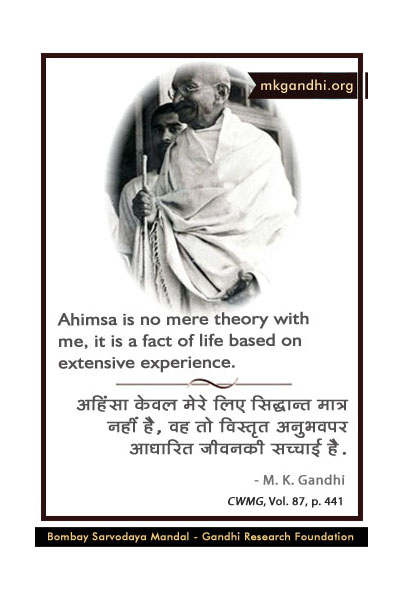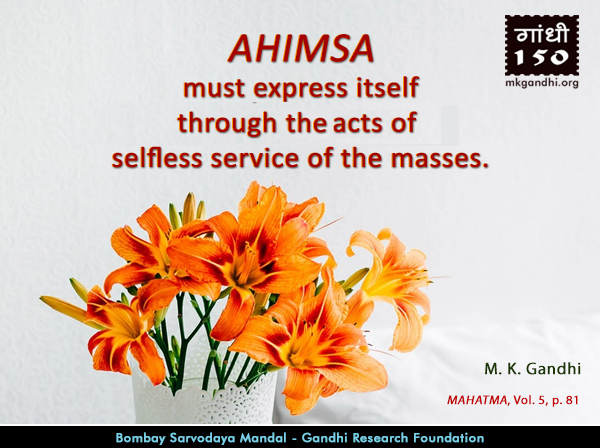Showing posts with label Nonviolence. Show all posts
Showing posts with label Nonviolence. Show all posts
Monday, June 21, 2021
Wednesday, January 20, 2021
Friday, January 1, 2021
Monday, December 28, 2020
Monday, May 25, 2020
Tuesday, January 22, 2019
Wednesday, August 1, 2018
GANDHI e-JOURNAL > August 2018
GANDHI e-JOURNAL > August 2018
1. The way to Peace @ https://www.mkgandhi.org/momgandhi/chap95.htm
2. Relevance of J.C. Kumarappa's Concept of Decentralization in Modern India - By M.P. Guruswamy
@ https://www.mkgandhi.org/articles/relevance-of-kumarappa-concept-of-decentralization.html
@ https://www.mkgandhi.org/articles/relevance-of-kumarappa-concept-of-decentralization.html
3. Non-violent Action: Some Dilemmas - By M.S. John
@ https://www.mkgandhi.org/nonviolence/dilemmas.htm
@ https://www.mkgandhi.org/nonviolence/dilemmas.htm
Monday, September 19, 2016
Surrendered Naxals pass test on Gandhian principles
Surrendered Naxals pass test on Gandhian principles
The whole exercise is to help them drift away from path of violence
The whole exercise is to help them drift away from path of violence
A total of 55 surrendered Naxals who had dozens of murder and arson cases registered against them have fared very well in an exam on Gandhi’s life and principles conducted by Gadchiroli police.
In an effort to reform prisoners, the Maharashtra jail authorities conduct classes on Gandhian philosophy with the help of NGOs in most prisons. After these classes, it holds the Gandhi Peace Exams to gauge the prisoners’ understanding of the philosophy. The exercise would help them in drifting away from violence.
Speaking on the endeavour, Additional Director General of Police (ADGP), Special Operations, Bipin Bihari said the surrendered Naxals were given lectures on Gandhian philosophy and an exam on the same was conducted in the month of August.
“Naxalites are waging a war against the state and we are trying to stimulate an ideology which shuns violence and preaches non-violence,” Bihari told The Indian Express.
“In order to draw the cadre to the Naxal fold, they are made to believe that armed revolution is the most effective solution. However, by introducing the Gandhian philosophy we are trying to instill the idea that demands could be met through non-violent means or ‘ahimsa’ (non-violence) which Gandhi preached and practised,” Bihari added.
In an effort to reform prisoners, the Maharashtra jail authorities conduct classes on Gandhian philosophy with the help of NGOs in most prisons. After these classes, it holds the Gandhi Peace Exams to gauge the prisoners’ understanding of the philosophy. The exercise would help them in drifting away from violence.
Speaking on the endeavour, Additional Director General of Police (ADGP), Special Operations, Bipin Bihari said the surrendered Naxals were given lectures on Gandhian philosophy and an exam on the same was conducted in the month of August.
“Naxalites are waging a war against the state and we are trying to stimulate an ideology which shuns violence and preaches non-violence,” Bihari told The Indian Express.
“In order to draw the cadre to the Naxal fold, they are made to believe that armed revolution is the most effective solution. However, by introducing the Gandhian philosophy we are trying to instill the idea that demands could be met through non-violent means or ‘ahimsa’ (non-violence) which Gandhi preached and practised,” Bihari added.
Thursday, September 8, 2016
NEW BOOKS PUBLISHED : Give Nonviolence a Chance
Give Nonviolence a Chance
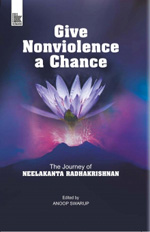 The Journey of Neelkanta Radhakrishnan
The Journey of Neelkanta Radhakrishnan
Edited by: Anoop Swarup
First Published : 2016
Pages : 348
Price : Rs. 650/-
Published by : Konark Publishers Pvt. Ltd.
206, First Floor, Peacock Lane, Shahpur Jat, New Delhi 110 049, India.
Tel. +91-11-41055065 | 65254972 | Email: india@konarkpublishers.com | Website: www.konarkpublishers.com
First Published : 2016
Pages : 348
Price : Rs. 650/-
Published by : Konark Publishers Pvt. Ltd.
206, First Floor, Peacock Lane, Shahpur Jat, New Delhi 110 049, India.
Tel. +91-11-41055065 | 65254972 | Email: india@konarkpublishers.com | Website: www.konarkpublishers.com
About the Book:
Give Nonviolence a Chance is a treasure trove of articles that showcase the peace initiatives and nonviolent campaigns of the peace activist, author, educator and philosopher, Neelakanta Radhakrishnan who devoted his entire life to the cause of peace and nonviolence and in reinterpreting and restructuring Gandhi's Peace Army, the Shanti Sena. Edited by Anoop Swarup, an internationally known scholar and peace activist and Chair, Center for Global Nonkilling, the book provides an inside view of several major campaigns.
Saturday, July 2, 2016
Gandhi Journal Article-I ( July 2016 ) - Gandhi is alive and still relevant
Gandhi Journal Article-I ( July 2016 )
Gandhi is alive and still relevant
By Dr. Kumarpal Desai
Mahatma Gandhi had given a talisman or mantra to Nehru. It was really a yardstick to use before making any decision. He told Nehru that before starting any work, think of the poorest man and keeping him in view, think whether your actions are going to benefit him in anyway.
This idea of Gandhi to help the poorest of the poor has brought about a peaceful revolution in the world. He has shown a way to this extremely materialistic, acquisitive, narrow-minded and selfish world. Today Gandhi may not be among us, but he manifests himself through many individuals in our society. Organisations like the Radical Party or the Greenpeace Party openly acknowledge that Mahatma Gandhi is their guide and they follow his path. Their policies are based on Gandhian principles.
This idea of Gandhi to help the poorest of the poor has brought about a peaceful revolution in the world. He has shown a way to this extremely materialistic, acquisitive, narrow-minded and selfish world. Today Gandhi may not be among us, but he manifests himself through many individuals in our society. Organisations like the Radical Party or the Greenpeace Party openly acknowledge that Mahatma Gandhi is their guide and they follow his path. Their policies are based on Gandhian principles.
Wednesday, March 16, 2016
Gandhi Journal Article-III (March 2016) : Gandhi's Philosophy of Nonviolence
Gandhi Journal Article-III (March 2016) :
Gandhi's Philosophy of Nonviolence
With Gandhi, the notion of nonviolence attained a special status. He not only theorized on it, he adopted nonviolence as a philosophy and an ideal way of life. He made us understand that the philosophy of nonviolence is not a weapon of the weak; it is a weapon which can be tried by all.
Nonviolence was not Gandhi’s invention. He is however called the father of nonviolence because according to Mark Shepard, “He raised nonviolent action to a level never before achieved.” 1 Krishna Kripalani again asserts “Gandhi was the first in Human history to extend the principle of nonviolence from the individual to social and political plane.”2 While scholars were talking about an idea without a name or a movement, Gandhi is the person who came up with the name and brought together different related ideas under one concept: Satyagraha.
Tuesday, May 12, 2015
New Book Published : Eyewitness Gandhi
Eyewitness Gandhi
Written by: Juhi Saklani
Consultant: Vivek Bhandari
First Published in India: July 014
Total Pages : 72 pages
Age : From 8 to 12 years
Price : Rs. 299/-
Published by : Dorling Kindersley Publishing Private Ltd.,
8 Local Shopping Centre, Panchsheel Park, New Delhi 110 017.
Written by: Juhi Saklani
Consultant: Vivek Bhandari
First Published in India: July 014
Total Pages : 72 pages
Age : From 8 to 12 years
Price : Rs. 299/-
Published by : Dorling Kindersley Publishing Private Ltd.,
8 Local Shopping Centre, Panchsheel Park, New Delhi 110 017.
About the Book:
DK Eyewitness Gandhi is a spectacular and informative guide to one of history's most complex and revered personalities. Striking photographs offer you a unique view of Mahatma Gandhi's legacy, tracing his life from his early childhood to his assassination, highlighting his affirmation as a leader, his involvement in Indian Independence and his timeless ideas about world peace.
READ BOOK REVIEW
Tuesday, March 10, 2015
Gandhi Journal Article-II: Gandhian Ethics of Fast-Nonviolence
Gandhian Ethics of Fast-Nonviolence
By By Maithili R. Gupte
Fasting is an institution as old as Adam. It has been resorted to for self-purification or for some ends noble as well as ignoble. Buddha, Jesus and Mohammed fasted so as to see God face to face. Ramchandra fasted for the sea to give way for his army of monkeys. Parvati fasted to secure Mahadev himself as her Lord and Master. In Gandhi's fast he follows these great examples, no doubt for ends much less noble than theirs. Even today this weapon of fasting used to fight against evils.
Non-violence is also old as human culture. Non-violence has occupies a pre-eminent position in Indian philosophy and religion. It has been the first among the five-fold virtues. Which form the essence of Hindu Ethics and are known by various names, such as pancayama, pancasila or panca-maha-vrata. Jainism placed it higher than truth (Satya). The Buddha identified it with universal compassion. It was regarded as equivalent to Dharma or the Moral Law - it was a necessary means to Moksa or salvation and vital part of the spiritual discipline prescribed by teachers of Yoga like Patanjali.
Now the question is - why does violence exist in us? Because we can't see ourselves as part of a universe, because we see ourselves as being separate. In that separation is violence. If we separate ourselves from everybody else, then of course, we have to fight for our own survival.
Non-violence is also old as human culture. Non-violence has occupies a pre-eminent position in Indian philosophy and religion. It has been the first among the five-fold virtues. Which form the essence of Hindu Ethics and are known by various names, such as pancayama, pancasila or panca-maha-vrata. Jainism placed it higher than truth (Satya). The Buddha identified it with universal compassion. It was regarded as equivalent to Dharma or the Moral Law - it was a necessary means to Moksa or salvation and vital part of the spiritual discipline prescribed by teachers of Yoga like Patanjali.
Now the question is - why does violence exist in us? Because we can't see ourselves as part of a universe, because we see ourselves as being separate. In that separation is violence. If we separate ourselves from everybody else, then of course, we have to fight for our own survival.
READ FULL ARTICLE
Saturday, November 1, 2014
Gandhi's Non-violent Approach
Gandhi's nonviolent approach offers lessons for peace movements, Stanford scholar says
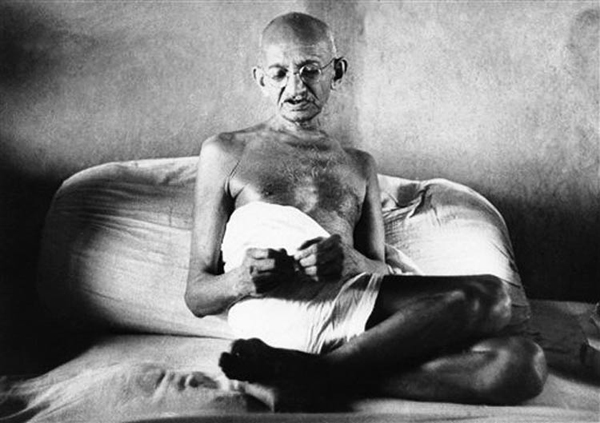
Mohandas Gandhi's organizational innovations were instrumental to the success of India's independence movement, Stanford scholar Saumitra Jha says.
The organizational innovations behind Mohandas Gandhi's nonviolent movement in India offer lessons for contemporary peace movements, a Stanford scholar argues.
In a new paper that reinterprets Gandhi's legacy, Stanford's Saumitra Jha, an associate professor of political economy, examines the potential and pitfalls of non-violent disobedience. His co-author is Rikhil Bhavnani, an assistant professor of political science at the University of Wisconsin-Madison.
Too often, nonviolent civil disobedience fails, they wrote. "The key lesson of India's successful movement is sometimes reduced to the simple but rather unhelpful admonition, 'Find another Gandhi,' who can lead through individual charisma," Jha said in an interview.
READ FULL ARTICLE
Tuesday, October 21, 2014
Gandhi - Peace Punchline Competition
International
Non-violence Day
Gandhi - Peace punchline
Competition
Give us a punch line
that promotes tolerance, non-violence, equality, peace, justice and so on.
Organized by
Gandhi Centre -
Australia Incorp.
Tuesday, August 12, 2014
Gandhi Journal Article - III
The Economics of Khadi
By Dr. Namita Nimbalkar
Gandhian economics cannot be regarded as a
distinct subject or discipline. It can at best be regarded as teachings and
practices of Mahatma Gandhi. It includes study of all relevant economic
activities having a relevance to Indian conditions. These economic activities
include production, distribution, consumption, public finance and sarvodaya.
The core of the Gandhian economics is the basic principles of truth and non
violence. Therefore Gandhian economics refers to all such economic activities
undertaken within the framework of truth and non violence and accepted ethical
standards in which man is regarded as the central point of the study.
Tuesday, January 7, 2014
Gandhi Journal Article - II
Violence and Non-violence Today: How Gandhian Principles can
help in reducing violence
By
Ravi Bhatia
There are serious problems of deprivation and marginalisation
being faced by millions across the world. Although people suffer silently,
occasionally they rise up in protest and commit violence on the state and the
other individuals. This paper discusses the nature of different forms of
violence and factors leading to it. In addition, it seeks to bring out the
relevance of Gandhian principles of truth, Satyagraha, non-violence, proper
educational system and religious tolerance, and argue that these principles can
be applied in the contemporary situation for reduction of conflict and violence
by advancing the welfare of the deprived, protection of environment, promoting
peace and understanding among peoples. These principles have a universal validity
and have been successfully adopted by several countries and peoples.
Saturday, December 7, 2013
Lasting legacy : Nelson Mandela's evolution as a strategic leader
Lasting legacy: Nelson Mandela's evolution as a strategic leader
The life story of Nelson Mandela is well known, and elevated him to the level of such widely recognised heroes as Mahatma Gandhi and Mother Teresa. There was indeed much courage, sacrifice, wisdom and nobility in his life -attributes that demand our deep respect and have much to teach us.
Saturday, July 13, 2013
Malala Yousafzai invokes Mahatma Gandhi in her UN speech
Malala Yousafzai invokes Mahatma Gandhi in her UN speech
Pakistani teen activist Malala Yousafzai, in her first public speech at the United Nations since being shot in the head by the Taliban, has said she is inspired by Mahatma Gandhi's path of non-violence.
Malala invoked Gandhi and other global advocates of non-violence stressing that, "I'm not against anyone, neither am I here to speak in terms of personal revenge against the Taliban, or any other terrorist group."
"I'm here to speak about the right of education for every child," Malala said, in an impassioned address to the UN Youth Assembly on Friday.
Friday, June 28, 2013
Mandela's Transformation: A Lesson for Us All
Mandela's Transformation: A Lesson for Us All
 Today, Nelson Mandela is in the hearts of many.
Today, Nelson Mandela is in the hearts of many.
 Today, Nelson Mandela is in the hearts of many.
Today, Nelson Mandela is in the hearts of many.
Subscribe to:
Comments (Atom)
